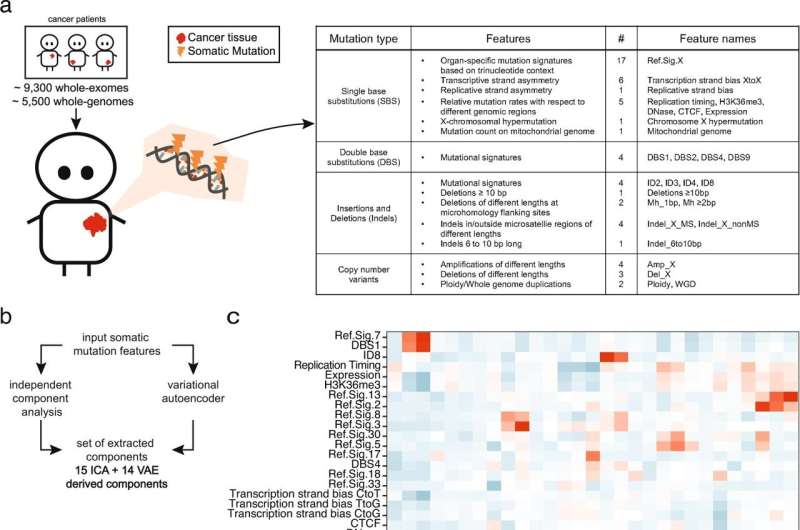Hereditary factors that increase the likelihood of cancer mutations detailed in new study

Mutations occur in various tissues and organs of an individual. Somatic mutations occur in cells that will not give rise to offspring and are therefore not passed on to subsequent generations. Caused by a large number of factors such as age and smoking, somatic mutations are the main cause of cancer and also play a role in other diseases.
A Nature Communications study led by ICREA researchers Dr. Fran Supek at the Institute for Research in Biomedicine (IRB Barcelona) and Dr. Ben Lehner at the Center for Genomic Regulation (CRG) has identified hereditary genetic traits that predispose individuals to the appearance of specific types of somatic mutations in their tissues. People with higher mutation rates in an organ are more likely to accrue mutations in key cancer genes which may increase the risk of tumor formation.
Researchers have previously described the hereditary mechanisms that predispose individuals to cancer, though many tumors do not have a clear genetic explanation. It is conceivable that cancer risk might result from changes in the spectrum of different types of somatic mutations, a common cause of cancer.
"In this comprehensive study we checked whether different types of changes to DNA observed in tumors were associated with inherited variants in many different genes. We developed a methodology that has allowed us to identify 42 genes, related to 15 different cellular mechanisms, that affect the risk of different types of somatic mutations. This might help explain risks of cancer predisposition," explains Dr. Mischan Vali Pour, who led the study whilst a doctoral student in the laboratories of Dr. Lehner and Dr. Supek.
"While a few examples of genes responsible for changing patterns of somatic mutations were known before, such as the BRCA genes that predispose to breast and ovarian cancer, and the Lynch syndrome genes that predispose to colon cancer, we now find many other genes that can similarly affect somatic mutation accumulation," says Dr. Fran Supek, Head of the Genome Data Science Laboratory at IRB Barcelona.
Future work based on this study may help assess the hereditary risk of a patient developing a specific type of cancer and, therefore, to personalize their prevention program and/or detect the disease in its early stages. Additionally, cancer treatments might be able to be personalized via somatic mutational signatures, as shown by another recent study from the IRB Barcelona.
Genomic instability and the risk of cancer
Most of the mechanisms involved in the generation of mutations are related to defects in the repair of damaged DNA. This results in a phenomenon known as genomic instability, reducing the time needed for the appearance of the two to 10 mutations in cancer driver genes that are typically necessary for the development of a tumor.
Also, each of the identified mechanisms bring about different types of mutations, or in different areas of the genome, and can, therefore, be related to cancer arising in particular organs.
Statistical and machine learning methods
To make these predictions, the researchers developed a methodology based on statistical genomics and a machine learning model—the so-called "autoencoder" neural network—that can find patterns in complex data. The study analyzed 11,000 genome sequences from cancer patients of European ancestry.
One of the limitations of the study is the great variability of heritable factors related to somatic mutations and the relatively low prevalence of each of these factors individually. The number of genome sequences available limits the ability to spot links between genes and mutations. Access to more genomic data from cancer patients of non-European ancestries could lead to further findings.
"As more genetic data become available, additional genetic predisposing factors for cancer mutagenesis are likely to be found. The 'rare' genetic variants that we considered here, while each of them is present in only a few individuals, are collectively quite important in shaping cancer genomes and possibly cancer risk," concludes Dr. Ben Lehner, Head of the Genetic Systems Laboratory and Coordinator of the Systems Biology Program at the CRG.
More information: Mischan Vali-Pour et al, The impact of rare germline variants on human somatic mutation processes, Nature Communications (2022). DOI: 10.1038/s41467-022-31483-1


















